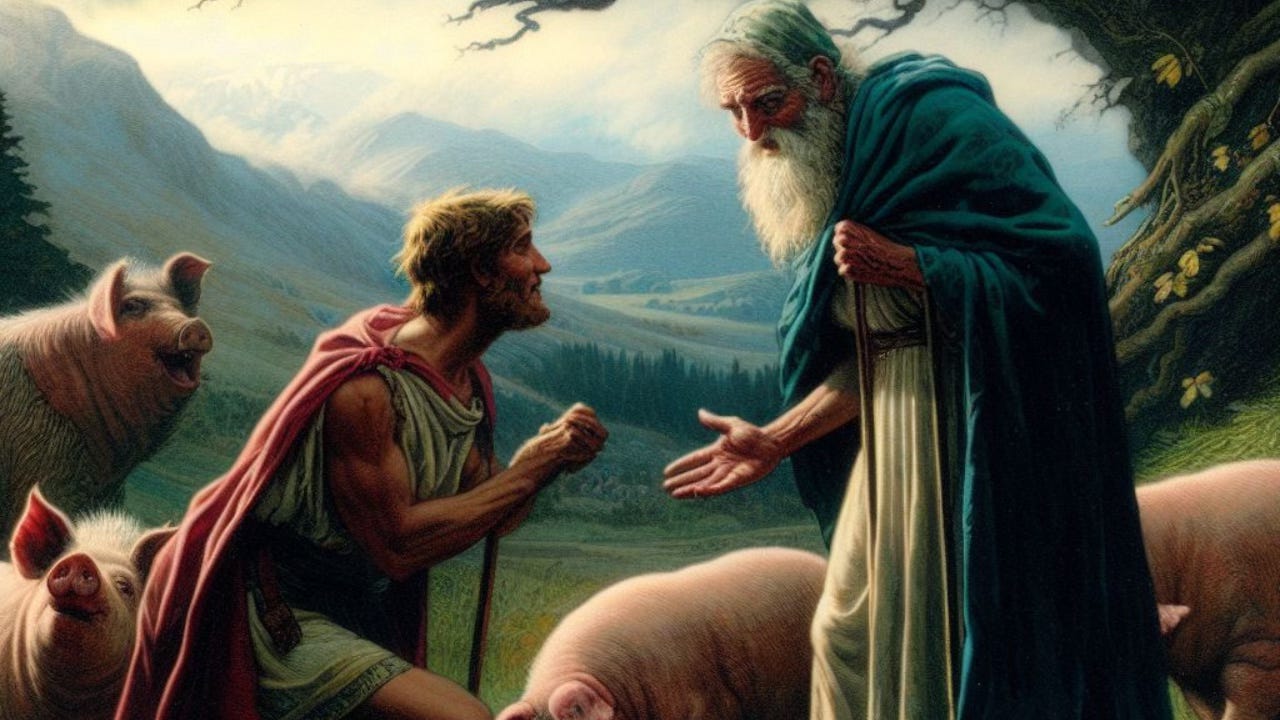Introduction
There is a rather famous story you may have heard of – "The Odyssey." It is an epic tale written by Homer. I am sure, dear reader, that even if you haven't read it, you've at least heard of this epic narrative. It follows the travels of a man named Odysseus. However, this particular essay has little to do with that character. Instead, it will focus on the loyal swineherd, Eumaeus, who served Odysseus. Eumaeus tended to the farmstead of Ithaca and was the last loyal follower of Odysseus, apart from his actual family. I believe we can learn a lot from this "loyal swineherd." So, let's examine him!
The Swineherd
'Lucky to be alive, old man—a moment more, and my pack would have torn you limb from limb! Then you’d have covered me with shame. As if the gods had never given me blows and groans aplenty...’
Our introduction to Eumaeus is quite different from our introduction to the many other inhabitants of Ithaca. Many of them, indeed most of them, scorn Odysseus, disregarding or even insulting him. The first to die would be Antinous, who was arrogant and threw a chair at the disguised Odysseus. He was the most cocky and, in many ways, the symbol of the "new regime" of Ithaca, which no one was particularly fond of, especially Eumaeus. The Loyal Swineherd was dedicated to Odysseus for a good reason, as the "suitors" brought nothing good, only chaos and misery.
Here I sit, my heart aching, broken for him, my master, my great king—fattening up his own hogs for other men to eat, while he, starving for food, I wager, wanders the earth, a beggar adrift in strangers’ cities.
Anyone who has read "The Odyssey" knows that Odysseus is not the most perfect character in the world. He is rather flawed, like everyone in reality. However, he is the "good king." Eumaeus called him the "great king" because objectively, he is the better option. He is cunning and shrewd, with typically noble motivations, seeking to return to his wife and his country. Of course, he is not always loyal and is constantly waylaid, yet he represents the good. Odysseus aims to restore order to the chaotic mess that Ithaca has become, whereas the Suitors have destroyed the island, representing something new and corrupt. I would argue that they represent unconsidered innovation, possibly irreverent innovation. They embody innovation for its own sake, not out of necessity but for the greed of self. They are the hubris of a teenager who says "Okay boomer" in response to any old idea.
Be Eumaeus Amongst the Suitors
I do not want to be perceived as the old, crotchety man who sits on his porch and shakes his fist at "those darn kids!" Primarily because I am not that old yet. However, the urge to be that way is nearly irresistible. The reason for this is the presence of many suitors, representing the Spirit of the Age. They flirt with the postmodern condition and desire to discard all that came before, while cynically chuckling "Okay boomer." They are irreverent and sardonic, perpetually believing themselves to be the smartest in the room. Socrates, Aristotle, Augustine, Lewis, Shakespeare, Washington, and Jefferson are, in their eyes, impotent thoughtless troglodytes who never even had a smartphone. Clearly, the age of the AC is the greatest age of all time, and anyone before us was witless.
However, I would caution against taking such an approach, even though we have access to limitless data at our fingertips. We seem to be far more witless than in past ages. For example, in one of my classes, we had to write a research paper, and a fellow student chose to write about juvenile detention. Seeking to explain why juveniles commit crimes and how to prevent them, he casually used the buzzword/theory "labeling theory," a rather new and fancy notion of crime. I could tell from his presentation that he used that theory for "street cred." No professor would mark you down for using that theory, but I wanted to know why he found the theory compelling in this context. So, during the Q&A, I asked him, to which he responded with rambling and confusion, confirming my suspicion that he simply picked the newest shiniest theory with no particular thought.
This is the issue with blindly embracing modernity and innovating for the sake of innovation. In the wise words of Dr. Ian Malcolm, "Your scientists were so preoccupied with whether they could, they didn't stop to think if they should." The story of humanity is one of rejecting tradition simply because it is traditional and "prudish." The hubris of mankind is our demise. We throw off the shackles of the ancients and say "Don't worry, I got this," plunging forward boldly, believing that rejecting objective morals will probably turn out all right. Yet, to quote a much wiser man than Dr. Malcolm or myself,
Rhetoric is no substitute for reality - Thomas Sowell.
So, I would urge everyone to be like Eumaeus amongst the suitors, paying attention to what came before. Do not blindly accept whatever is new and shiny; it's possible that those before us were wiser. Or at least that newness might not be synonymous with being better and smarter. Maybe the reason that ideas have persisted for a millennium is that they are better, and deserving careful deliberation. Perhaps Eumaeus was better, wiser, and more powerful than Antinous because he revered what came before. Odysseus wasn't a perfect noble lord, and neither is History. Not every old idea is better than the new, but nor should it be wholly thrown away. Therefore, I urge you all to be like Eumaeus in the midst of the many suitors!
Did you enjoy this article? If you did, or found it interesting at all, please consider sharing the article with a friend!





